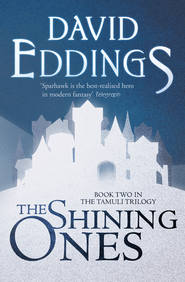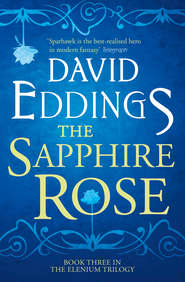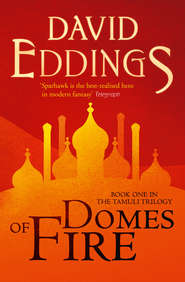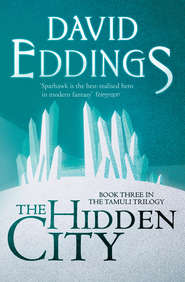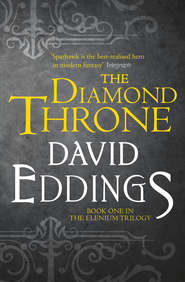По всем вопросам обращайтесь на: info@litportal.ru
(©) 2003-2025.
✖
Polgara the Sorceress
Автор
Год написания книги
2019
Настройки чтения
Размер шрифта
Высота строк
Поля
‘This is disgusting,’ I muttered to uncle Beldin, who was sitting beside me.
Beldin, who was uncharacteristically clean – largely at Beldaran’s insistence – put on a look of pious innocence. ‘Surely you can’t object to the desire to honor those we love and respect, Pol,’ he said. ‘Excuse me a moment,’ he added. Then he stood up. ‘Ladies and gentlemen!’ he thundered, ‘I give you the Lady Polgara!’
‘Lady Polgara!’ They roared in unison, and they all drank deeply to me.
At some point about midway through the banquet, Beldaran and Riva slipped away. The party grew progressively rowdier, and uncle Beldin was drinking everything in sight.
I endured it for as long as I could, but then a bearded Alorn at the far end of the table rose unsteadily to his feet, spilled half his ale over the lady who sat beside him, and lifted his tankard. He belched. ‘Par’n me,’ he said absently. ‘Ladies an’ Gentleman, I give you my dog, Bowser!’
To Bowser!’ they all shouted enthusiastically, and then they drank.
That did it! I stood up.
To whom did you want to drink, Pol?’ Beldin asked, his eyes unfocused and his speech slurred.
I know I shouldn’t have done it, and I apologized profusely the next morning, but I was just a little irritated at that point. ‘Why to you, of course, uncle dear,’ I replied sweetly. ‘My Lords and Ladies,’ I announced, ‘I give you my dear, dear uncle Beldin.’
And then I poured a tankard of ale on his head and stormed out of the banquet hall, followed by the rest of the ladies.
Alorns have an enormous capacity for strong ale, so their celebration lasted for three days.
I chose not to attend.
On the morning of the fourth day after the wedding, father stopped by my rooms. We chatted for a while, and then Cherek Bear-shoulders was admitted. Cherek looked decidedly unwell, but he seemed to be more or less sober. ‘I was talking with Dras and Algar this morning,’ he said, ‘and Algar thought we might want to get together to exchange some information. We don’t have much chance to meet and talk very often, and there’s a lot going on in the world.’
‘Probably not a bad idea,’ father agreed. ‘Why don’t you go get Riva, and I’ll see if I can locate Beldin.’ He squinted at me. ‘Why don’t you join us as well, Pol?’ he suggested.
‘What on earth for?’
‘For my peace of mind, daughter dear,’ he said somewhat pointedly.
‘It shall be as my father commands,’ I replied with feigned obedience.
‘She has beautiful manners, doesn’t she?’ Cherek noted.
‘Don’t make such hasty judgments, Cherek,’ father warned him.
And so it was that I sat in on the first sessions of what came to be known as ‘the Alorn Council’. At the outset I only sat in the background and listened. The main topic of discussion was the presence of Angaraks on this side of the Sea of the East, and I didn’t really know very much about Angaraks.
I’d been a bit apprehensive about being in such close proximity to Dras and Algar, fearing that one – or both – might seize this opportunity to press unwelcome suits. That was when I discovered that kings probably don’t make very good husbands, since when politics rears its head, a king becomes all business. Dras and Algar had obviously stopped thinking of me as a woman. For them I was simply another council member.
My isolated childhood had not prepared me for the concept of racial differences, and I’m not talking here about purely physical differences. Alorns tend to be tall and blond, while Tolnedrans tend to be short and dark. All other differences are largely cultural. Alorns are encouraged to enjoy a good fight, while Tolnedrans are encouraged to make money. I discovered early on in the discussions that Angaraks are encouraged to be afraid of Torak – and by extension of his Grolim priesthood. Despite some superficial differences, there’s a Thull lurking at the bottom of every Angarak soul.
So long as Torak’s people had remained in Mallorea, they’d posed no real threat, but now that the Murgos, Nadraks, and Thulls had crossed the land bridge, the Alorns felt that it was time to stop just talking about the Angaraks and to start doing something about them.
It seemed to me, though, that everyone else in the room was missing something. They appeared to hate all Angaraks indiscriminately, paying far too little attention to the cultural differences that made Angarak society much less monolithic than it appeared on the surface. The typical Alorn’s approach to any problem is to start sharpening his battle-axe, but I saw at the outset that the only thing direct confrontation would accomplish would be the solidification of the Angaraks, and that was the last thing we wanted.
I was right on the verge of triumphantly pointing that out when mother stopped me. ‘That isn’t the way to do it, Pol,’ her voice told me. ‘Men are afraid of intelligent women, so suggest instead of announcing. Plant the seed of an idea in their minds and let it grow. They’ll be much more likely to come around if they think the idea was theirs in the first place.’
‘But–’ I started to protest.
‘Try it my way, Pol,’ she said. ‘Just point them in the right direction and then tell them how wonderful they are when they do it right.’
‘I think it’s silly, mother, but I’ll try it.’
My first rather self-effacing suggestion had to do with establishing trade relations with the Nadraks, and much to my surprise that went down rather smoothly. I sat back and let the Alorns discuss the notion long enough to forget where it came from, and then they decided to give it a try. Then I planted the idea of making some overtures to the Tolnedrans and Arends, and Cherek and his boys accepted that as well.
In his sometimes misguided history of the world, my father notes that I enjoyed politics. He was right about that, but he missed the real point entirely. When father uses the word ‘politics’ he’s talking about relations between nations. When I use the word, though, I’m talking about the various subtle ways a woman can get men to do what she wants them to do.
If you want to see an expert in this art, go watch Queen Porenn in action. The real genius, however, is Queen Layla of Sendaria.
We met off and on several more times that week, but our most important decisions were made in that first session. When I realized that the men were going to spend most of their time chewing old soup, I let my mind wander. I considered mother’s revelation, and the more I thought about it, the more sense it made. There are differences between men and women, and the obvious physical differences are the least important. The differences in our minds are far more relevant.
Bear-shoulders offered to take father, uncle Beldin and me to the Sendarian coast in his war-boat, but the night before we were to leave, uncle Beldin changed his mind about that. ‘Maybe I’d better go back to Mallorea and keep an eye on old Burnt-face instead,’ he said. The Murgos, Nadraks, and Thulls are just an advance party, I think. They aren’t going to be able to accomplish very much without reinforcements from Mallorea. Nothing’s really going to happen on this side of the Sea of the East until Torak orders his armies to march north from Mal Zeth.’
‘Keep me posted,’ father told him.
‘Naturally, you clot,’ Beldin retorted. ‘Did you think I was going to go to Mallorea just to renew old acquaintances with Urvon and Zedar? If Burnt-face starts to move, I’ll let you know.’
It was midsummer by the time father and I reached the Vale, and the twins were eagerly awaiting our return. They’d prepared a feast for us, and we ate in that airy, pleasant tower of theirs as evening settled golden over the Vale. I’ve always liked their tower for some reason. Father’s tower is messy and cluttered, uncle Beldin’s is fanciful on the outside, but quite nearly as cluttered as father’s on the inside. The twins, however, had the foresight to build closets and storerooms on the lower levels of their tower, so they can put things away. Father probably won’t care for this comparison, but his tower’s very much like a single room set on top of a pole. It’s a solid stone stump with a room on the highest level, and uncle Beldin’s isn’t much better.
After we’d finished eating, uncle Belkira pushed back his plate. ‘All right,’ he said, ‘now tell us about the wedding – and about this monumental change in Polgara.’
‘The change in Pol is easy,’ father replied. ‘She just slipped around behind my back and grew up.’
‘Young people have a habit of doing that,’ uncle Belkira noted.
‘There was a little more to it than that, father,’ I said. ‘Beldaran was always the pretty one.’
‘Not really, Pol,’ uncle Belkira disagreed. ‘She’s blonde, and you’re brunette. That’s the only real difference. You’re both beautiful.’
I shrugged. ‘All girls want to be blonde,’ I told him. ‘It may be a little silly, but we do. After I realized that I’d never be as pretty as she is, I tried to go the other way. When we reached Camaar and she and Riva finally met each other, I saw that how I looked was the farthest thing from her mind, so I cleaned myself up.’ I laughed a little ruefully. ‘It took me hours to comb all the snarls out of my hair. Then we reached the Isle of the Winds, and I discovered that I wasn’t as ugly as I’d thought.’
That might just be the grossest understatement in history,’ father said. ‘Now that she’s cleaned off all the dirt, she’s moderately presentable.’
‘More than moderately, Belgarath,’ Beltira said.
‘Anyway,’ father continued, ‘when we reached the Isle of the Winds, she stunned a whole generation of young Rivans into near-insensibility. They absolutely adored her.’
‘Was being adored nice, Pol?’ Belkira teased.
‘I found it quite pleasant,’ I admitted, ‘but it seemed to make father very nervous. I can’t for the life of me understand why.’
‘Very funny, Pol,’ father said. ‘Anyway, after the wedding, we had a talk with Bear-shoulders and his sons. They’ve had some contacts with the Angaraks, and we’re all beginning to grope our way toward a greater understanding of the differences between the Murgos, Thulls, and Nadraks. We can thank Pol for that.’ His sidelong glance was as sly as mine had been. ‘You didn’t think I noticed what you were doing, did you, Pol? You were very smooth about it, though.’ Then he looked ruminatively at the ceiling. ‘As Pol so gently pointed out, we’re more likely to have some luck with the Nadraks than with the Murgos or Thulls. The Thulls are too stupid and too much afraid of the Grolims to be of much use, and Ctuchik controls the Murgos with an iron fist. The Nadraks are greedy, though, so a bit of judicious bribery might win them over – at least enough to make them a useful source of information.’
‘Are there any signs that more Angaraks are coming across the land-bridge?’ Beltira asked.
‘Not from what Bull-neck’s been able to discover. Torak’s evidently biding his time, waiting for the right moment. Beldin went back over to Mallorea to keep an eye on him – at least that’s what he says he’s going to do. I still think he might want to take up that discussion about white-hot hooks with Urvon, though. Anyhow, he pointed out that the Murgos, Nadraks, and Thulls are just an advance party. The game won’t really get started until Torak decides to come out of seclusion at Ashaba.’







